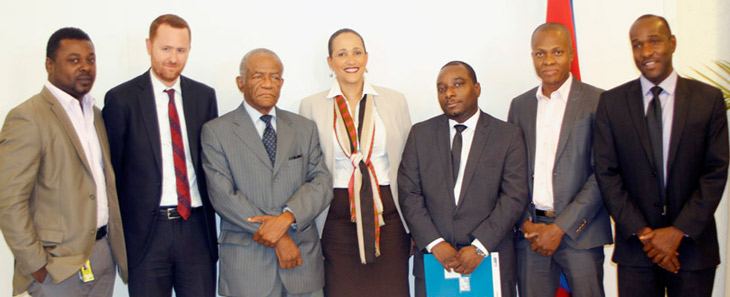The Health Policy Project ended in 2016. Work continued under Health Policy Plus (HP+) until 2022.
NEWS & VIEWS

Photo by Health Policy Project
August 24, 2015
By Patrick Camille, Vantz Brutus, Sahita Pierre-Antoine, and Annie Chen
A year after the adoption of a comprehensive law to combat human trafficking, on August 12, 2015, the President of Haiti officially instituted a National Counter-Trafficking Committee, which will act as the guarantor of the law’s application and ensure institutional coordination in all programs aiming to protect victims of trafficking and prosecute traffickers. The formation of the committee was done in collaboration with the Institute for Social Welfare (French acronym, IBESR), International Organization for Migration (IOM), the Ministry of Social Affairs (French acronym, MAST), and other partners such as the USAID-funded HPP AKSE project.
In June 2014, the Government of Haiti enacted the law which criminalizes trafficking. The law publishes legislation which prohibits trafficking and all forms, with penalties that are commensurate with those for other serious crimes.
“Developing this national plan of action against trafficking in persons and establishing the national committee against trafficking demonstrated the Haitian’s government’s willingness to reduce trafficking and provide assistance to the victims.”
Jean Robert Vaval
Chief of Cabinet for MAST
Before the law’s adoption Haiti’s image had long been tarnished by the lack of legal measures penalizing human trafficking. The Government of Haiti had not fully complied with the minimum standards for the elimination of trafficking but it is making significant strides to do so.[1] Haiti was ranked number two in the world in prevalence of modern slavery by the 2013 Global Slavery Index.[2] Due to the lack of concrete measures to sanction perpetrators and protect the survivors, Haiti is known as a country of origin, transit, and destination for victims of trafficking in persons.[3]
According to Jean Robert Vaval, chief of cabinet for MAST, “developing this national plan of action against trafficking in persons and establishing the national committee against trafficking demonstrated the Haitian government’s willingness to reduce trafficking and provide assistance to the victims.” Organized and led by the Government of Haiti with technical support from HPP AKSE, the action plan was developed during a workshop with human rights stakeholders and civil society organizations.
In order to accelerate the implementation of this law, in collaboration with the School of Magistrates and HPP AKSE, the Government of Haiti launched a series of national judicial trainings to implement the legal framework for the protection of children and women. Judges, legal actors, and stakeholders providing social welfare services participated in these trainings. While this is a step in improving the human rights situation and decreasing trafficking in Haiti, there is still much to be done to increase accountability for trafficking offenders and guide the implementation of this law for deeply entrenched Haitian traditions, like the restavek tradition.[4]
[1] U.S. Department of State. Haiti: Trafficking in Persons Report. Accessed at http://www.state.gov/j/tip/rls/tiprpt/countries/2013/215476.htm on 29 April 2015.
[2] The Global Slavery Index. 2013. Haiti. Available at http://www.globallaveryindex.org/ . Accessed 29 April 2015.
[3] U.S. Department of State. Haiti: Trafficking in Persons Report. Accessed at http://www.state.gov/j/tip/rls/tiprpt/countries/2013/215476.htm on 29 April 2015.
What's New
- Something to Build On: “Innovation Exchange” Celebrates the Health Policy Project’s Close and a New Beginning
- What Will it Take for Tanzania to Achieve ART Targets and Ensure Long-Term Sustainability of the HIV Response?
- Helping Kenya’s County Leaders Advocate for Increased Health Investments
- HPP Holds Working Meeting on Ensuring Responsible PEPFAR Transitions for Key Populations
- Health Policy Project Celebrates 2016 International Women's Day
- HPP Staff Participate in White House Conference on HIV Stigma Reduction

